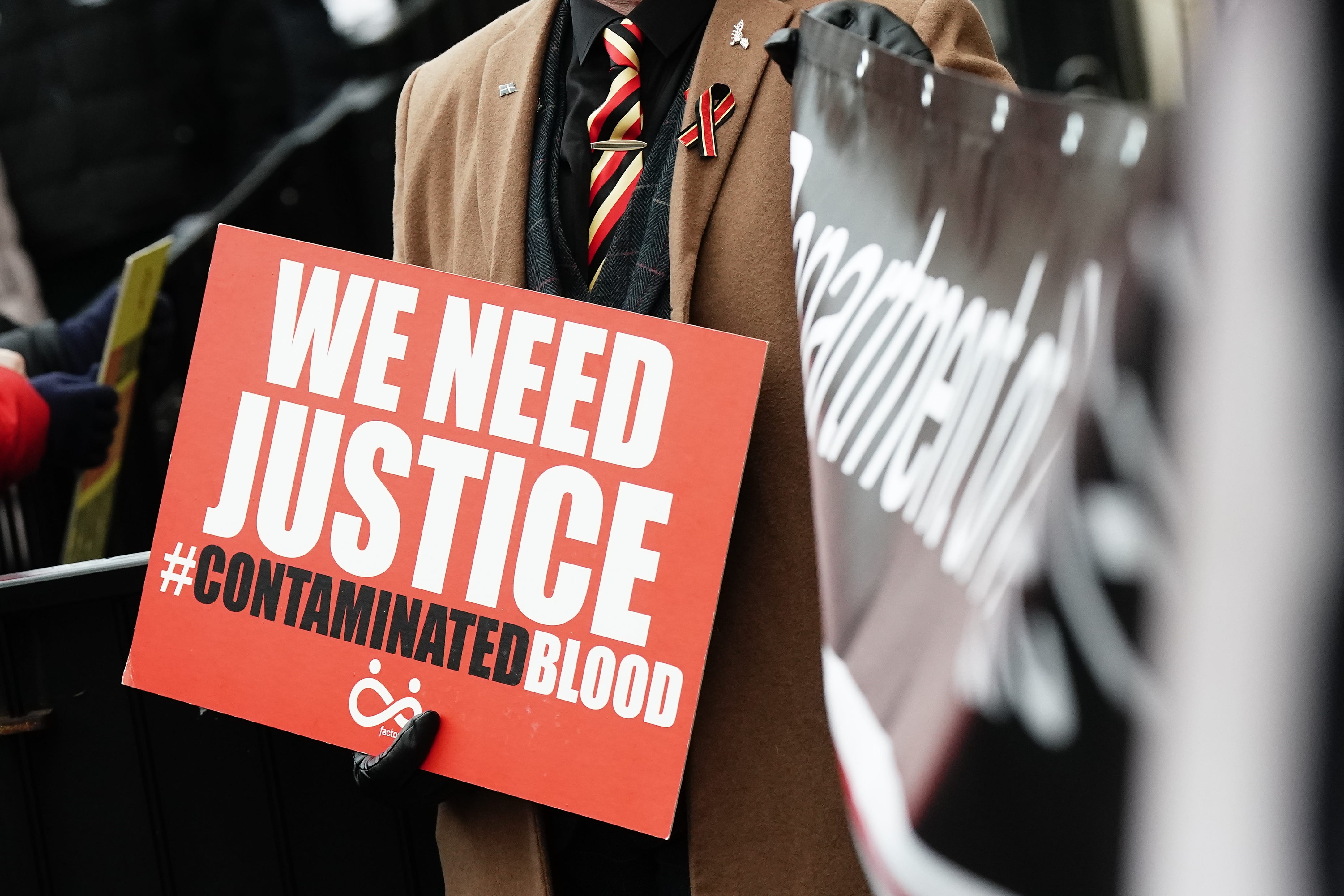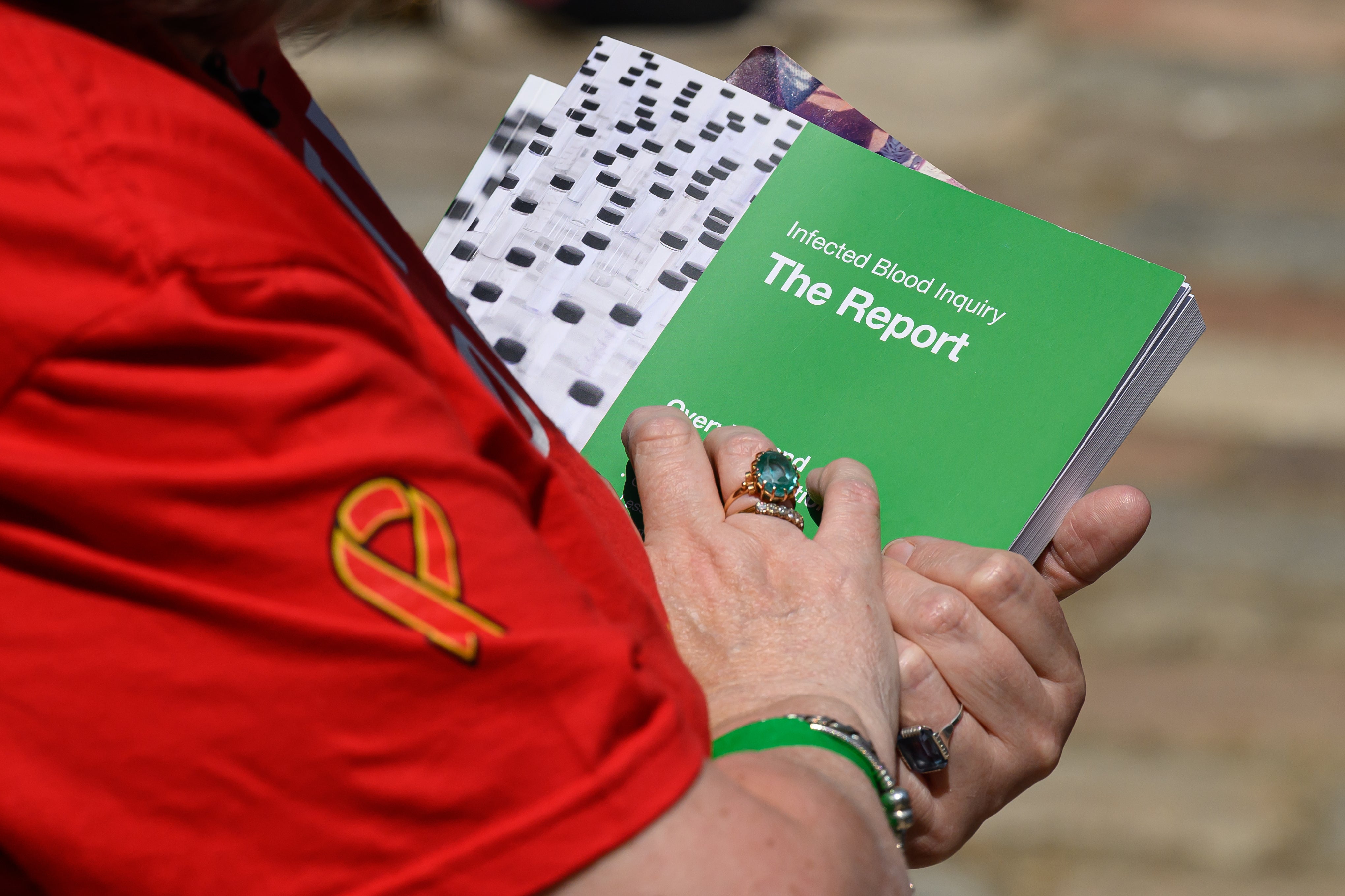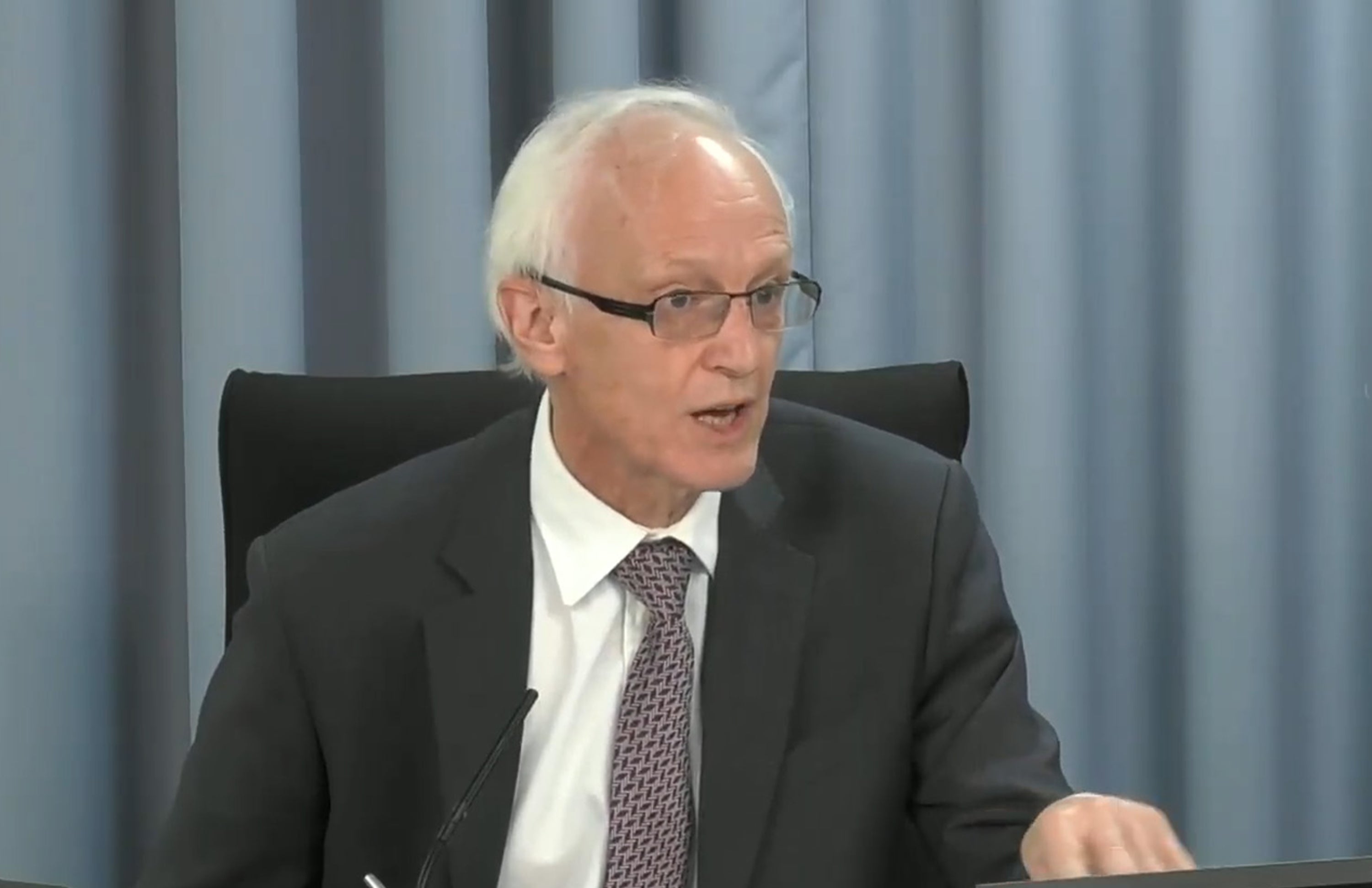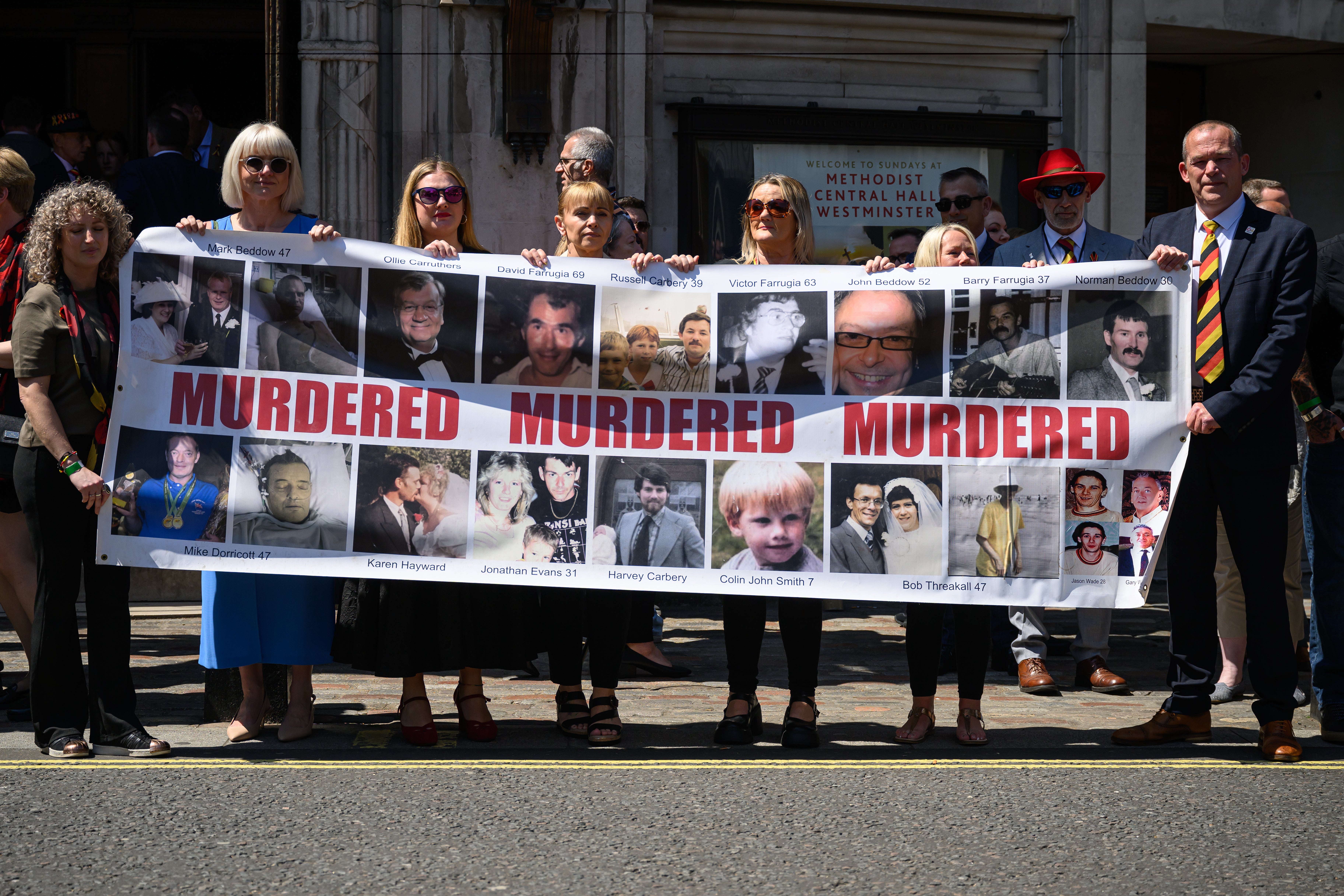Infected blood inquiry scandal - live: Sunak calls report ‘day of shame’ and vows to give victims compensation
Prime minister also apologises to victims as inquiry finds catalogue of failures by successive governments and NHS after tens of thousands avoidably infected with HIV and Hepatitis
Your support helps us to tell the story
From reproductive rights to climate change to Big Tech, The Independent is on the ground when the story is developing. Whether it's investigating the financials of Elon Musk's pro-Trump PAC or producing our latest documentary, 'The A Word', which shines a light on the American women fighting for reproductive rights, we know how important it is to parse out the facts from the messaging.
At such a critical moment in US history, we need reporters on the ground. Your donation allows us to keep sending journalists to speak to both sides of the story.
The Independent is trusted by Americans across the entire political spectrum. And unlike many other quality news outlets, we choose not to lock Americans out of our reporting and analysis with paywalls. We believe quality journalism should be available to everyone, paid for by those who can afford it.
Your support makes all the difference.The prime minister has called the findings of the inquiry into the infected blood scandal a “day of national shame”, as he pledged to give victims compensation and apologised to them on behalf of successive governments.
Addressing the House of Commons on Monday following the publication of the damning 2,527-page report, Rishi Sunak said: “I want to make a whole-hearted and unequivocal apology for this terrible injustice.”
He also promised to pay “comprehensive compensation” to those affected and infected by the scandal. “Whatever it costs to deliver this scheme, we will pay it,” he added, saying details would be set out on Tuesday.
Politicians, doctors and civil servants were found guilty of a chilling cover-up in the report, which laid bare a catalogue of failures by successive governments and the NHS that amounted to a “calamity”.
Tens of thousands of people were avoidably infected with HIV and Hepatitis in the worst treatment disaster in the history of the NHS, which led to the deaths of around 3,000 patients.
The report into the shameful scandal found the public was falsely reassured, children were treated unnecessarily, evidence was deliberately destroyed, and a significant number of people remain undiagnosed after receiving blood transfusions in the 1970s, 80s and 90s.
Some patients were “betrayed” because tests were carried out on them without their knowledge or consent.
John Glen, the Cabinet Office minister dealing with the scandal on behalf of the government, has refused to rule out criminal proceedings for those involved.
Treloar’s pupils treated with contaminated blood regarded as ‘objects for research’
Pupils at a school were regarded “as objects for research” when they were treated with multiple, risky contaminated blood products.
Sir Brian Langstaff has highlighted the plight of the children who attended Treloar’s boarding school as he spoke on stage in the wake of the publication of the Infected Blood Inquiry’s damning report.
Between 1970 and 1987, 122 young boys who were pupil’s at Lord Mayor Treolar College were infected with HIV and Hepatitis C through contaminated products - only 30 of these pupils are alive. Research was conducted on pupils, who were subsequently infected.
The inquiry found in its report there is “no doubt that the risks of viruses, in particular hepatitis being transmitted through blood or blood products were well known to Treloar’s clinicians…clinical staff were well aware that their heavy use of commercial concentrate risked causes AIDS.”

Inquiry says compensation scheme must be set up “now” for tens of thousands harmed by infected blood
First in a suite of recommendations from infected blood inquiry chair Sir Brian Langstaff is for the government to set up a compensation scheme for victims.
Ministers have earmarked around £10 billion for a compensation package for those affected, which is expected to be announced on Tuesday or Wednesday.
In shocking revelations the inquiry has suggested there are potentially hundreds of undiagnosed individuals who have been unknowingly infected. It has recommended doctors should offer all patients who had blood transfusions before 1996 a blood test for Hepatitis C.
The inquiry told the government it should commit to implementing its 12 recommendations, within which there are more than 50 actions, in the next 12 months or give sufficient reasons got why it cannot.
The report also said the government’s Public Administration and Constitutional Affairs Committee should be able to review any future refusal by ministers to bring about a statutory public inquiry and that it should review the government’s timetable for inquiry implementing recommendations.
Other recommendations from the inquiry include stricter requirements on health officials to be held accountable for cultures of “defensiveness” and a “lack of openness” in their organisations.
Patients ‘needlessly exposed’ to infections for months ‘for no clear reason’, concludes Sir Brian
The inquiry chair has concluded patients were “needlessly being exposed” to infections for months “for no clear reason”.
The introduction of a universal screening test for HIV in October 1985 came a year and a half after the virus was identified due to “delays and indecisions”, Sir Brian Langstaff told an audience at Central Hall Westminster.
He said the screening for Hepatitis C was not introduced until as late as September 1991.
He went on to highlight how government and doctors knew AIDS could be transferred via blood products in 1982, yet people were being given contaminated blood into the 1990s.
He described the government’s response as “unconscionably slow”.
Blood donors should have been better selected, Langstaff says
Sir Brian Langstaff said that blood donors should have been better selected.
“The blood used for transfusions and to make blood products in the UK was from British donors, who could and should have been better selected,” he said.
“For instance, in 1975 the chief medical officer for England said the practice of collecting blood in prisons could continue even though prisoners were known to have higher numbers of hepatitis infections – and this practice was not ended in the UK until 1984; no real efforts were made to prevent those who had used intravenous drugs – and who were therefore a higher risk of hepatitis – from donating blood; and the steps taken to keep donors who were more likely to be incubating Aids out of the donation chain were late in starting, and when they finally began were inadequate.”

On the process of pooling blood plasma donations together, he added: “The use of only small pools lasted until after 1970. Then, however, something extraordinary happened. Just as the long term seriousness of hepatitis became more and more apparent, the size of the pools used to make UK blood products grew ever larger and larger, and with that so too did the risks. Instead of reducing the risk, the UK was steadily increasing it.”
Meanwhile he said the UK was “wrong” to licence blood plasma products from the US in the 1970s, where donors were paid for their donations.
“The licensing authority knew too that these products were made from very large pools,” he said.
“The risks of hepatitis were freely admitted by the makers. I have concluded the UK was wrong to decide to license these products in 1973, and later decisions in the 1970s to grant further licences for similar US products were also wrong. These products should simply not have been permitted to be distributed generally in this country.”
Health leaders ‘did not put patient safety first'
Infected Blood Inquiry chairman Sir Brian Langstaff has said that health leaders “did not put patient safety first”.
He said in a statement made to victims and their loved ones: “Tragically, the infections happened because those in authority – doctors, the blood services and successive governments – did not put patient safety first.
“They lost sight of what was known about the risks of viral infections from blood. ‘Doctor knows best’ was such a strong belief that health departments did not issue guidance to curb the unsafe use of blood and blood products.
“Decision-making on measures that could make blood and blood products safer was put off, then dragged out unnecessarily, and failed to reach clear and decisive conclusions.
“And patients were simply not given the information they needed to make fully informed decisions about their own treatment.”
Successive governments compounded suffering
Successive governments and the health service compounded victims’ suffering, Infected Blood Inquiry chairman Sir Brian Langstaff said.
In his statement, the former high court judge said: “The NHS and successive governments compounded the agony by refusing to accept that wrong had been done.
“More than that, the Government repeatedly maintained that people received the best available treatment and that testing of blood donations began as soon as the technology was available. And both claims were untrue.”
Sir Brian said the inquiry’s mission to prevent similar scandals is not only about “taking steps to meet any threat of a future infection carried by blood, blood products or tissue, but to ensure as far as we can that Government responds to the citizens it serves, how shall I put this, more appropriately”.
‘Every aspect’ of victim’s lives affected
Sir Brian Langstaff said that infections have impacted “every aspect” of the lives of the affected.
“Early on, in particular, they had to do so whilst being shunned, or worse, abused, by neighbours, workmates, by people they had once thought of as friends. Sometimes by health professionals.
“The Inquiry is not just investigating something which happened years ago. It is still happening.
“People still have to care for the after-effects of what happened which their loved ones still suffer. The grief and trauma which all of those who lost loved ones experienced continues to this day.
“The early treatments for HIV and Hepatitis C, were often worse than the illnesses themselves; the side-effects linger, and for a number of those infected with Hepatitis C the damage done over so many years to their liver has left them at risk of developing cancer and requiring liver transplants.
“Every aspect of their lives has been defined by their infections – childhood; education; career; leisure; relationships; marriages; home-ownership; travel; finances; dreams and ambitions have been lost and relationships broken.”
People put their faith in government to keep them safe - and their trust was betrayed’
The chair of the Infected Blood Inquiry has said the trust victims put in governments to keep them safe was “betrayed”.
Speaking at Central Hall Westminster after the publication of the damning report into the scandal, Sir Brian Langstaff said: “People put their faith in government to keep them safe - and their trust was betrayed.
“The NHS and successive governments compounded the agony by refusing to accept that wrongs had been done.”

Harm done to people cannot adequately be put into words, says inquiry chair
Sir Brian Langstaff has been welcomed to the stage at Central Hall Westminster by a long round of applause.
The chair of the Infected Blood Inquiry told the central London audience upon the publication of the inquiry’s damning report: “The harm that was done to people cannot adequately be put into words.”
He called the infection of tens of thousands of people with “life-changing” viruses a “horror”, as the number of people dying on top of the 3,000 who have already died in the scandal continues to climb “week-by-week”.

Speaking to an audience at Central Hall in Westminister, the chair of the infected blood inquiry said “dreams and ambitions” of victims “have been lost”.
Sir Brian Langstaff said: “It really takes a person who has lived and is living with them to describe them in a way which brings home the horror that has happened.
He added: “People put their faith in doctors and in the government to keep them safe and their trust was betrayed.”
Subscribe to Independent Premium to bookmark this article
Want to bookmark your favourite articles and stories to read or reference later? Start your Independent Premium subscription today.






Join our commenting forum
Join thought-provoking conversations, follow other Independent readers and see their replies
Comments